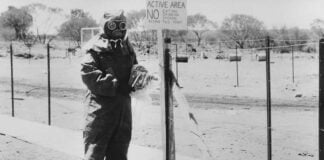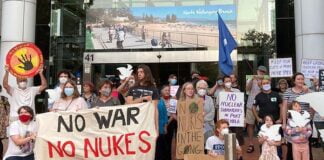Review: The Hurt Locker
Directed by Kathryn Bigelow, In cinemas now
The Hurt Locker is a violent, politically shallow and confusing film. The film makers claim to be apolitical but in effect justify the American occupation of Iraq.
One reviewer has described the film as “one of the most effective recruiting vehicles for the U.S. Army that I have seen”. It’s not hard to see why. The American soldiers are depicted as heroic, and their combat missions exciting and action charged.At no stage do we see the war from an Iraqi point of view.
In this film the war in Iraq exists without a context, like a series of meaningless news reports on the channel Nine news.
The film is shot in an almost documentary “shaky cam” style that gives the audience a feeling of being embedded with the soldiers. We are fooled into thinking that this is a realistic depiction of the war.
This impression is false, the Hurt Locker is at heart a fantasy movie set in a fantasy world: a phantasmagorical place where the good guys of the US army fight an unending battle against chaos.
Insurgents are a shadowy evil that never shows its face.
The main character, Staff Sergeant William James (or Will for short), is a bomb disposal specialist. He is highly reckless and unprofessional.
When faced with a car, sagging to the ground with a load of explosives, Will doesn’t follow a methodical bomb disposal procedure.
Instead he simply kicks open the car boot to reveal a precarious load of high explosive ordinance that he proceeds to defuse in a slapdash manner. When asked how many bombs he has defused in this way Will replies, “873”.
Apparently Will is a wild man, high on the drug of war, for whom the usual laws of probability do not apply.
Applying rational thought and reason to the problem, Will’s two colleagues Sergeant JT Sanborn and Specialist Owen Eldridge discuss whether to knock him off before he gets them all killed.
The film shows the American soldiers as human, affected by the stress of the war and indulging in drinking and macho fighting. But this only serves to reinforce their heroism and status as manly, larger than life figures.
Resistance
In contrast the Iraqi resistance are depicted as perpetrators of inhumane depravity. One example is the horrific bomb in a body sequence.
Inside an insurgent hideout, (that comes fully equipped with a camera for making YouTube videos), Will finds a body, surgically packed with explosives.
In response to the horror Will goes off on a personal quest to bring the perpetrators to justice. This begins a weakly veiled metaphor for the narrative that has been invented around the Iraq war.
Will misunderstands the situation and makes mistakes, but deep down he is still good and somewhat wholesome.
The audience is left with the impression that although the war is psychologically damaging it is necessary. If Will isn’t there in Iraq, who is going to defuse the bombs?
When Will finally returns to civilian life, the boredom of a suburban supermarket and domestic life is a strong contrast to the adrenaline-charged excitement of combat. Like any good soldier, he wants to go back to the war.
The reality is that the Iraq war has been a horror—for the American soldiers and the Iraqi people alike. In helping rehabilitate the US military, this film does them all a disservice.
By Josh Wood





